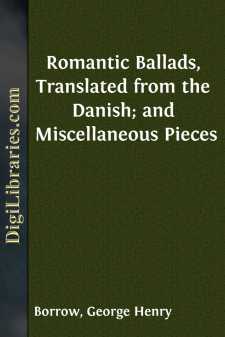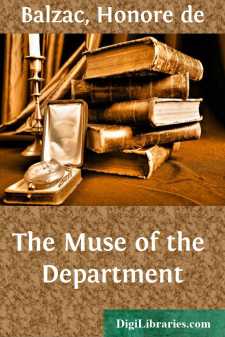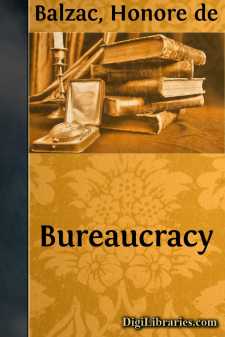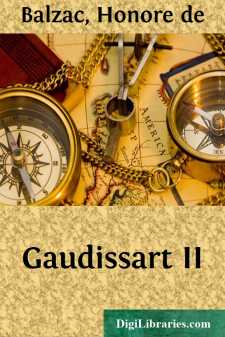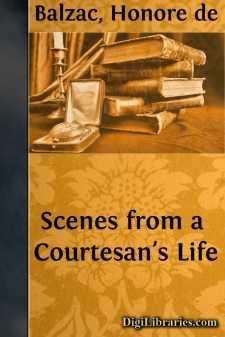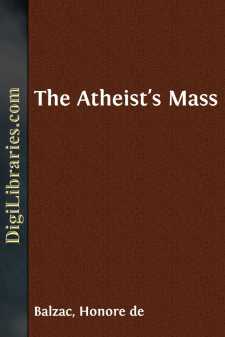Literary Collections
- American 84
- Ancient, Classical & Medieval 14
- Asian 1
- Australian & Oceanian 1
- Canadian 55
- Continental European
- English, Irish, Scottish, Welsh 179
- Essays 160
- General 24
- Letters 46
- Middle Eastern 1
Continental European Books
Sort by:
Through gloomy paths unknown— Paths which untrodden be,From rock to rock I roam Along the dashing sea. BOWRING. * * * * * NORWICH:printed and published by jarrold and sons.1913 Contents. Preface Lines from Allan Cunningham to George Borrow The Death-raven. From the Danish of Oehlenslæger Fridleif and Helga. From the Danish of Oehlenslæger Sir Middel. From the Old Danish...
more...
by:
Honore de Balzac
COLONEL CHABERT "HULLO! There is that old Box-coat again!" This exclamation was made by a lawyer's clerk of the class called in French offices a gutter-jumper—a messenger in fact—who at this moment was eating a piece of dry bread with a hearty appetite. He pulled off a morsel of crumb to make into a bullet, and fired it gleefully through the open pane of the window against which he was...
more...
by:
Honore de Balzac
THE MUSE OF THE DEPARTMENT On the skirts of Le Berry stands a town which, watered by the Loire, infallibly attracts the traveler's eye. Sancerre crowns the topmost height of a chain of hills, the last of the range that gives variety to the Nivernais. The Loire floods the flats at the foot of these slopes, leaving a yellow alluvium that is extremely fertile, excepting in those places where it has...
more...
by:
Honore de Balzac
CHAPTER I. MADAME JULES Certain streets in Paris are as degraded as a man covered with infamy; also, there are noble streets, streets simply respectable, young streets on the morality of which the public has not yet formed an opinion; also cut-throat streets, streets older than the age of the oldest dowagers, estimable streets, streets always clean, streets always dirty, working, laboring, and...
more...
by:
Honore de Balzac
CHAPTER I. THE RABOURDIN HOUSEHOLD In Paris, where men of thought and study bear a certain likeness to one another, living as they do in a common centre, you must have met with several resembling Monsieur Rabourdin, whose acquaintance we are about to make at a moment when he is head of a bureau in one of our most important ministries. At this period he was forty years old, with gray hair of so pleasing...
more...
by:
Honore de Balzac
GAUDISSART II. To know how to sell, to be able to sell, and to sell. People generally do not suspect how much of the stateliness of Paris is due to these three aspects of the same problem. The brilliant display of shops as rich as the salons of the noblesse before 1789; the splendors of cafes which eclipse, and easily eclipse, the Versailles of our day; the shop-window illusions, new every morning,...
more...
by:
Honore de Balzac
ESTHER HAPPY; OR, HOW A COURTESAN CAN LOVE In 1824, at the last opera ball of the season, several masks were struck by the beauty of a youth who was wandering about the passages and greenroom with the air of a man in search of a woman kept at home by unexpected circumstances. The secret of this behavior, now dilatory and again hurried, is known only to old women and to certain experienced loungers. In...
more...
INTRODUCTION The highest living authority on French Literature—Professor George Saintsbury—has said: "The Cent Nouvelles is undoubtedly the first work of literary prose in French, and the first, moreover, of a long and most remarkable series of literary works in which French writers may challenge all comers with the certainty of victory. The short prose tale of a comic character is the one...
more...
by:
Honore de Balzac
THE ATHEIST'S MASS Bianchon, a physician to whom science owes a fine system of theoretical physiology, and who, while still young, made himself a celebrity in the medical school of Paris, that central luminary to which European doctors do homage, practised surgery for a long time before he took up medicine. His earliest studies were guided by one of the greatest of French surgeons, the illustrious...
more...
by:
Honore de Balzac
THE MESSAGE I have always longed to tell a simple and true story, which should strike terror into two young lovers, and drive them to take refuge each in the other's heart, as two children cling together at the sight of a snake by a woodside. At the risk of spoiling my story and of being taken for a coxcomb, I state my intention at the outset. I myself played a part in this almost commonplace...
more...


